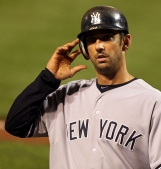By Derek Rosenfeld
There’s an old sports adage that states, “A ballplayer dies twice”–once at the end of life, the other when he “hangs it up” and officially stops playing the game he has played since he was a child. One moment, he is an adolescent dreaming of playing on the same level where his heroes play. Next, he’s a little leaguer learning the basics of the game, taking to it like a fish to water; his natural ability is immediately apparent.
The years pass. He becomes a high school phenom and, perhaps, a college standout. He then becomes the focus of professional scouts and local media. He gets drafted into the professional ranks and turns into one of the game’s hardest workers. He becomes the next hot prospect and, after showing his mettle in the minor-league ranks, gets the call up to the highest level of sport. Now among the elite, he goes through some early ups and downs to become one of the few who actually STAYS at that highest level.
The years continue to pass as the athlete continues to improve. He becomes an all-star and, for years, is recognized throughout the league for his consistency and work ethic. More years pass. He may become a free agent a time or two along the way and change teams, but his play remains the same. Fifteen, perhaps 20 years go by.
His skills show signs of waning as he moves into his mid to late 30s. His legs are a little bit heavier, his body is not withstanding the punishment of a full season like it once did. Professional sports being the cold and fickle business that it is, the athlete begins to hear grumblings among fans and media for the first time ever that it may be time to replace the aging star. He then hears whispers of a young kid who is being groomed to replace him, and maybe that time to replace him is now. Being a professional competitor all his life, he tries to disregard the talk as gibberish. But as his productivity falls, the calls for his retirement grow.
Over the next two to three years, the athlete looks to hang on with other teams, but the pickings are slim, and he is finding no takers. Most teams are going with a youth movement, which is both forward thinking and financially motivated. It seems
 |
| Jorge Posada turned 40 on August 17 |
Since the Internet boom of the mid-1990s, the common professional sports fan has had more access to the sidelines, dugouts, and benches—not to mention an outlet for uninformed opinions presented as facts—than ever before. One of the residual effects of this information overload is a prevailing attitude from these fans that they believe themselves as knowing when an athlete is “done.” His numbers are down. He’s slower. He’s regularly injured. He’s over 35 years old.
Since the inception of professional sports, there has always been a narcissistic tendency by the fans to assume that the athletes view the game as they do–they must play for the love and only the love; consider the game’s history sacred; and, under any circumstances, never cheat. The idea that being a professional athlete is also a job goes over the head of many of the most ardent sports fans, who feel that the athlete should know, as they see so clearly, when it is time to move on.
 |
| Randy Moss “retired” on August 1 |
When potential NFL Hall of Fame Wide Receiver Randy Moss announced his “retirement” from football this past August 1, did fans and the media really believe this was the last we’d heard from the supremely talented but controversial star? Moss had been going through some professional issues at the time of his decision, and it may have been borne out of some present frustration. He had suffered a long line of negative public relations incidents, and his inability to stick with one team for an extended period of time since he left the Minnesota Vikings in 2005 may have boiled over with this knee-jerk reaction. My prediction is that you will see Moss back on an NFL field by the middle of the season, if not sooner.
In Part 2 of this article on athletes’ “retirement,” we’ll take a look at several famous (and infamous) cases regarding this subject and what can be learned about the athletes who either refuse to quit or, in a few cases, leave too soon.
Images found on Wikimedia Commons courtesy of Keith Allison.
 Derek Rosenfeld is an associate editor for Fire Engineering. He has been the assistant baseball coach at Bergen Community College in Paramus, New Jersey, since 2005. He has also been an infielder in several highly competetive semipro baseball leagues throughout the tri-state area. During the mid-90s, Rosenfeld was a three-year starter at second base for the Ramapo College baseball team in Mahwah, New Jersey, where he earned all-New Jersey Athletic Conference honors and was a two-time New Jersey Collegiate Baseball Association (NJCBA) all-star selection. He was named MVP of the 1997 NJCBA All-Star Game. He has a bachelor’s degree in communications from Ramapo College.
Derek Rosenfeld is an associate editor for Fire Engineering. He has been the assistant baseball coach at Bergen Community College in Paramus, New Jersey, since 2005. He has also been an infielder in several highly competetive semipro baseball leagues throughout the tri-state area. During the mid-90s, Rosenfeld was a three-year starter at second base for the Ramapo College baseball team in Mahwah, New Jersey, where he earned all-New Jersey Athletic Conference honors and was a two-time New Jersey Collegiate Baseball Association (NJCBA) all-star selection. He was named MVP of the 1997 NJCBA All-Star Game. He has a bachelor’s degree in communications from Ramapo College.


